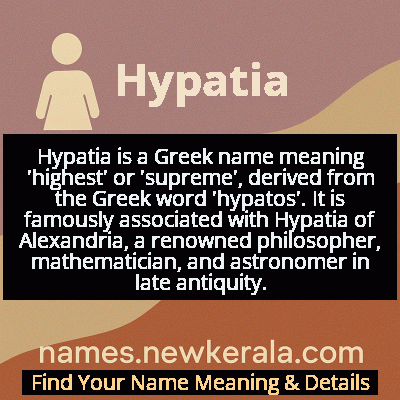Hypatia Name Meaning & Details
Origin, Popularity, Numerology Analysis & Name Meaning of Hypatia
Discover the origin, meaning, and cultural significance of the name HYPATIA. Delve into its historical roots and explore the lasting impact it has had on communities and traditions.
Name
Hypatia
Gender
Female
Origin
Greek
Lucky Number
8
Meaning of the Name - Hypatia
Hypatia is a Greek name meaning 'highest' or 'supreme', derived from the Greek word 'hypatos'. It is famously associated with Hypatia of Alexandria, a renowned philosopher, mathematician, and astronomer in late antiquity.
Hypatia - Complete Numerology Analysis
Your Numerology Number
Based on Pythagorean Numerology System
Ruling Planet
Saturn
Positive Nature
Ambitious, efficient, realistic, and authoritative.
Negative Traits
Materialistic, stressed, confrontational, and can be overly ambitious.
Lucky Colours
Dark blue, black.
Lucky Days
Saturday.
Lucky Stones
Blue sapphire, amethyst.
Harmony Numbers
2, 4, 6.
Best Suited Professions
Business leaders, managers, financial services, law enforcement.
What People Like About You
Leadership, determination, organizational skills.
Famous People Named Hypatia
Hypatia of Alexandria
Philosopher, Mathematician, Astronomer
Last head of the Library of Alexandria, wrote important commentaries on mathematics and astronomy
Hypatia Bradlaugh Bonner
Writer, Activist
Prominent peace activist and secularist writer in late 19th-early 20th century Britain
Hypatia Cade
Fictional Scientist
Brilliant mathematician protagonist in multiple science fiction novels
Name Variations & International Equivalents
Click on blue names to explore their detailed meanings. Gray names with will be available soon.
Cultural & Historical Significance
Extended Personality Analysis
Those bearing the name Hypatia are typically characterized by exceptional intellectual curiosity and a profound dedication to the pursuit of knowledge. They possess sharp, analytical minds capable of grasping complex abstract concepts and making connections across different fields of study. This intellectual prowess is often accompanied by strong moral convictions and the courage to defend unpopular ideas, reflecting the historical Hypatia's commitment to truth despite political and religious pressures. Hypatias tend to be independent thinkers who value rationality and evidence over tradition or authority, making them natural innovators and critics of established norms. Their combination of intellectual depth and personal integrity often earns them respect, though they may sometimes struggle with practical matters or social conventions that they perceive as illogical. Despite their formidable intellect, they typically maintain a sense of humility about knowledge, recognizing its limits while continually seeking to expand them. This balance of confidence in their reasoning abilities with openness to new ideas makes them excellent teachers and mentors, capable of inspiring others while continuing their own intellectual growth.
Modern Usage & Popularity
In contemporary naming practices, Hypatia remains an uncommon but deeply meaningful choice that has experienced a modest resurgence in recent decades. The name appeals particularly to educated, progressive parents interested in classical history, philosophy, or women's empowerment. While it has never achieved mainstream popularity (consistently ranking outside the top 1000 names in the United States), it maintains a steady presence in academic and intellectual circles. The 2009 film 'Agora,' which dramatized Hypatia's life and featured Rachel Weisz in the title role, brought renewed attention to the name and likely contributed to its increased visibility. Current usage trends show the name being chosen by parents who want to honor both classical learning and feminist ideals, often as a statement about their values regarding education and gender equality. The name's rarity adds to its appeal for parents seeking distinctive names with substantial historical and intellectual weight, positioning Hypatia as a sophisticated alternative to more common classical names like Athena or Sophia.
Symbolic & Spiritual Meanings
Hypatia embodies profound symbolic meanings that transcend her historical existence to represent broader philosophical and cultural ideals. She symbolizes the eternal human quest for knowledge and the courageous defense of intellectual freedom against dogmatic oppression. As a historical figure murdered for her philosophical teachings, she represents the martyrdom of reason at the hands of religious fundamentalism, making her an enduring symbol of the Enlightenment values of free inquiry and secularism. Metaphorically, Hypatia stands at the crossroads of ancient wisdom and modern science, embodying the ideal of integrated knowledge where philosophy, mathematics, and astronomy converge in the pursuit of universal truth. Her legacy has made the name symbolic of women's intellectual capabilities and their right to participate fully in academic and scientific discourse. In contemporary contexts, naming a child Hypatia often represents a commitment to feminist principles, academic excellence, and the preservation of classical learning in modern education. The name carries the weight of cultural memory about both the achievements of classical civilization and the dangers of ideological extremism, serving as a reminder of what is lost when societies abandon rational discourse and tolerance.

